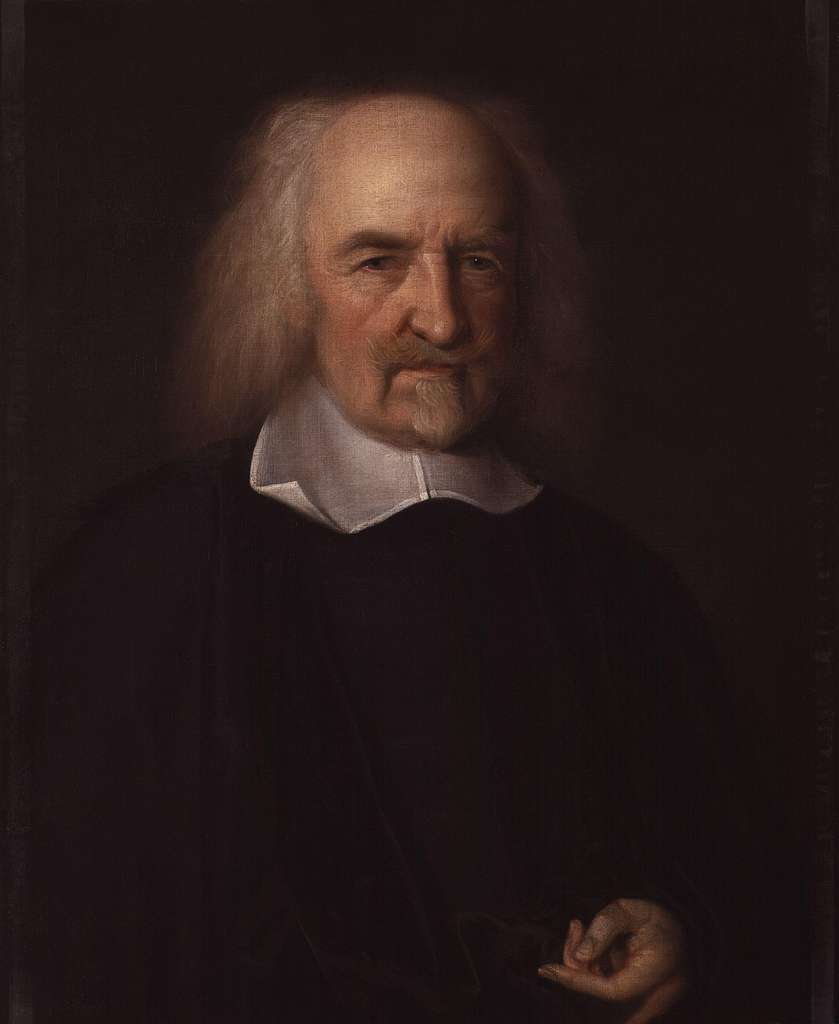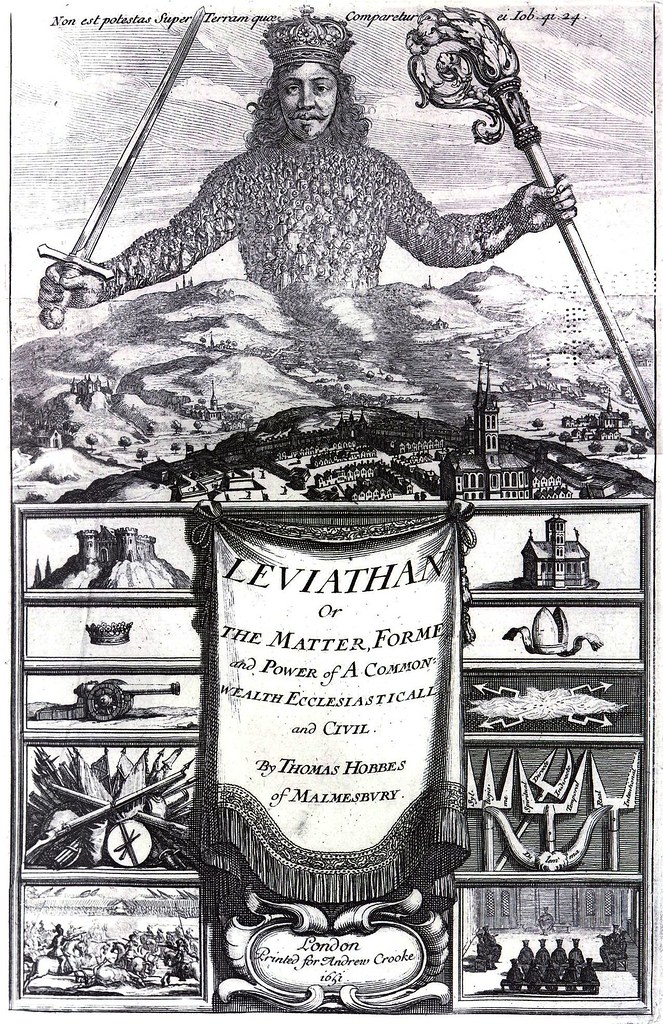7.2.1 Social Contract Theory: Hobbes
LEARNING OBJECTIVES
By the end of this section you will discover:
- How Thomas Hobbes argued in Leviathan that government was a social contract.
- How Hobbes insisted that:
- Humanity with out government would live in a brutal state of nature.
- Governments are formed for mutual protection.
- A powerful “sovereign” is necessary to enforce the terms of the social contract.
Thomas Hobbes (1588 –1679), a supporter of the monarchy, wrote Leviathan (a term taken from the Bible, Psalms 74:14 denoting a mighty sea creature, perhaps a whale) while in exile in France as a response to the current crisis. Hobbes believed that England without a strong monarchy was destined for chaos. The Leviathan served as his image

of what a strong monarchical government should be.
Importantly, he did not resort to the doctrine of Divine Right to do this. Instead, he asked his readers to enter with him into a thought experiment. He asked us to imagine a hypothetical “state of nature” before there was any government. Such a life, he claimed, would not be idyllic. It would be “solitary, poor, nasty, brutish, and short”—a war of “all against all.” Therefore, he argues, people will intentionally form a “social contract” in which they voluntarily give up some of their freedoms (e.g., their freedom to kill or steal from another) on the condition that others do the same. Hobbes believed that this contract is at the heart of all forms of government. Moreover, because he believed people were fundamentally selfish and wicked in nature and would seek to violate this contract whenever they could, Hobbes justified the need for a powerful “sovereign”—an absolute monarch with the authority to punish those who break the contract.
Contractarianism: Crash Course Philosophy #37
Excerpts from Thomas Hobbes’ Leviathan
In what follows, consider:
Given the relative equality of power in individuals, what does Hobbes suggest is an inevitable outcome?
The First Part: Of Man. Chapter XIII: Of the Natural Condition of Mankind as Concerning Their Felicity and Misery
Nature hath made men so equal in the faculties of body and mind as that, though there be found one man sometimes manifestly stronger in body or of quicker mind than another, yet when all is reckoned together the difference between man and man is not so considerable as that one man can thereupon claim to himself any benefit to which another may not pretend as well as he. …

From this equality of ability arises equality of hope in the attaining of our ends. And therefore, if any two men desire the same thing, which nevertheless they cannot both enjoy, they become enemies; and in the way to their end (which is principally their own conservation, and sometimes their delectation only) endeavor to destroy or subdue one another. …
…because there be some that, taking pleasure in contemplating their own power in the acts of conquest, which they pursue farther than their security requires, if others, that otherwise would be glad to be at ease within modest bounds, should not by invasion increase their power, they would not be able, long time, by standing only on their defense, to subsist. And by consequence, such augmentation of dominion over men being necessary to a man’s conservation, it ought to be allowed him.
… So that in the nature of man, we find three principal causes of quarrel. First, competition; secondly, diffidence; thirdly, glory.
The first makes men invade for gain; the second, for safety; and the third, for reputation. The first use violence, to make themselves masters of other men’s persons, wives, children, and cattle; the second, to defend them; the third, for trifles, as a word, a smile, a different opinion, and any other sign of undervalue, either direct in their persons or by reflection in their kindred, their friends, their nation, their profession, or their name.
Hereby it is manifest that during the time men live without a common power to keep them all in awe, they are in that condition which is called war; and such a war as is of every man against every man. For war consists not …in actual fighting, but in the known disposition thereto during all the time there is no assurance to the contrary. All other time is peace.
Whatsoever therefore is consequent to a time of war, … wherein men live without other security than what their own strength and their own invention shall furnish them withal…. is no place for industry, because the fruit thereof is uncertain: and consequently no culture of the earth; no navigation, nor use of the commodities that may be imported by sea; no commodious building; no instruments of moving and removing such things as require much force; no knowledge of the face of the earth; no account of time; no arts; no letters; no society; and which is worst of all, continual fear, and danger of violent death; and the life of man, solitary, poor, nasty, brutish, and short….
To this war of every man against every man, this also is consequent; that nothing can be unjust. The notions of right and wrong, justice and injustice, have there no place. Where there is no common power, there is no law; where no law, no injustice. Force and fraud are in war the two cardinal virtues. Justice and injustice are none of the faculties neither of the body nor mind. If they were, they might be in a man that were alone in the world, as well as his senses and passions. They are qualities that relate to men in society, not in solitude. It is consequent also to the same condition that there be no propriety, no dominion, no mine and thine distinct; but only that to be every man’s that he can get, and for so long as he can keep it. And thus, much for the ill condition which man by mere nature is actually placed in; though with a possibility to come out of it, consisting partly in the passions, partly in his reason….
Chapter XIV: Of the First and Second Natural Laws, and of Contracts
The right of nature, which writers commonly call jus naturale, is the liberty each man hath to use his own power as he will himself for the preservation of his own nature; that is to say, of his own life; and consequently, of doing anything which, in his own judgement and reason, he shall conceive to be the aptest means thereunto.
By liberty is understood, according to the proper signification of the word, the absence of external impediments; which impediments may oft take away part of a man’s power to do what he would but cannot hinder him from using the power left him according as his judgement and reason shall dictate to him.
A law of nature, lex naturalis, is a precept, or general rule, found out by reason, by which a man is forbidden to do that which is destructive of his life, or taketh away the means of preserving the same, and to omit that by which he thinketh it may be best preserved. For though they that speak of this subject use to confound jus and lex, right and law, yet they ought to be distinguished, because right consists in liberty to do, or to forbear; whereas law determines and binds to one of them: so that law and right differ as much as obligation and liberty, which in one and the same matter are inconsistent…..
The only way to … defend them from the invasion of Foreigners, and the injuries of one another, and thereby to secure them in such sort, as that by their own industry, and by the fruits of the Earth, they may nourish themselves and live contentedly; is, to confer all their power and strength upon one man, or upon one assembly of men, that may reduce all their wills, by plurality of voices, unto one will: which is as much as to say, to appoint one man, or assembly of men, to bear their person; and every one to own, and acknowledge himself to be author of whatsoever he that so bears their person [i.e., to act for them], shall act, or cause to be acted, in those things which concern the common peace and safety; and therein to submit their wills, … to his will, and their judgements, to his judgment.
… This done, the multitude so united in one person, is called a commonwealth, in Latin, civitas. This is the Generation of that great “Leviathan,” … [for by this] he has the use of so much power and strength conferred on him, that by terror thereof, he is enabled to [con]form the wills of them all, to peace at home, and mutual aid against their enemies abroad.
(Hobbes, Leviathan, in Thomas Hobbes – On The Social Contract, in McLaughlin: The Originals: Classic Readings in Western Philosophy)
Works Cited
CrashCourse. Contractarianiam: Crash Course Philosophy #37. YouTube, YouTube, 28 Nov. 2016, https://www.youtube.com/watch?v=gs_gY1K1AMU&t=180s. Accessed 13 May 2022.
“Frontispiece of Leviathan Engraved by Abraham Bosse, with Input from Thomas Hobbes, the Author.” Wikimedia Commons, 1651, https://commons.wikimedia.org/wiki/File:Leviathan_by_Thomas_Hobbes.jpg.
Hobbes, Thomas. Leviathan, Project Gutenberg, 2 July 2002, https://www.gutenberg.org/files/3207/3207-h/3207-h.htm.
Wright, John Michael. “Thomas Hobbes Portrait.” National Portrait Gallery, 1669, https://www.npg.org.uk/collections/search/portrait/mw03164/Thomas-Hobbes?LinkID=mp02204&role=sit&rNo=0.

